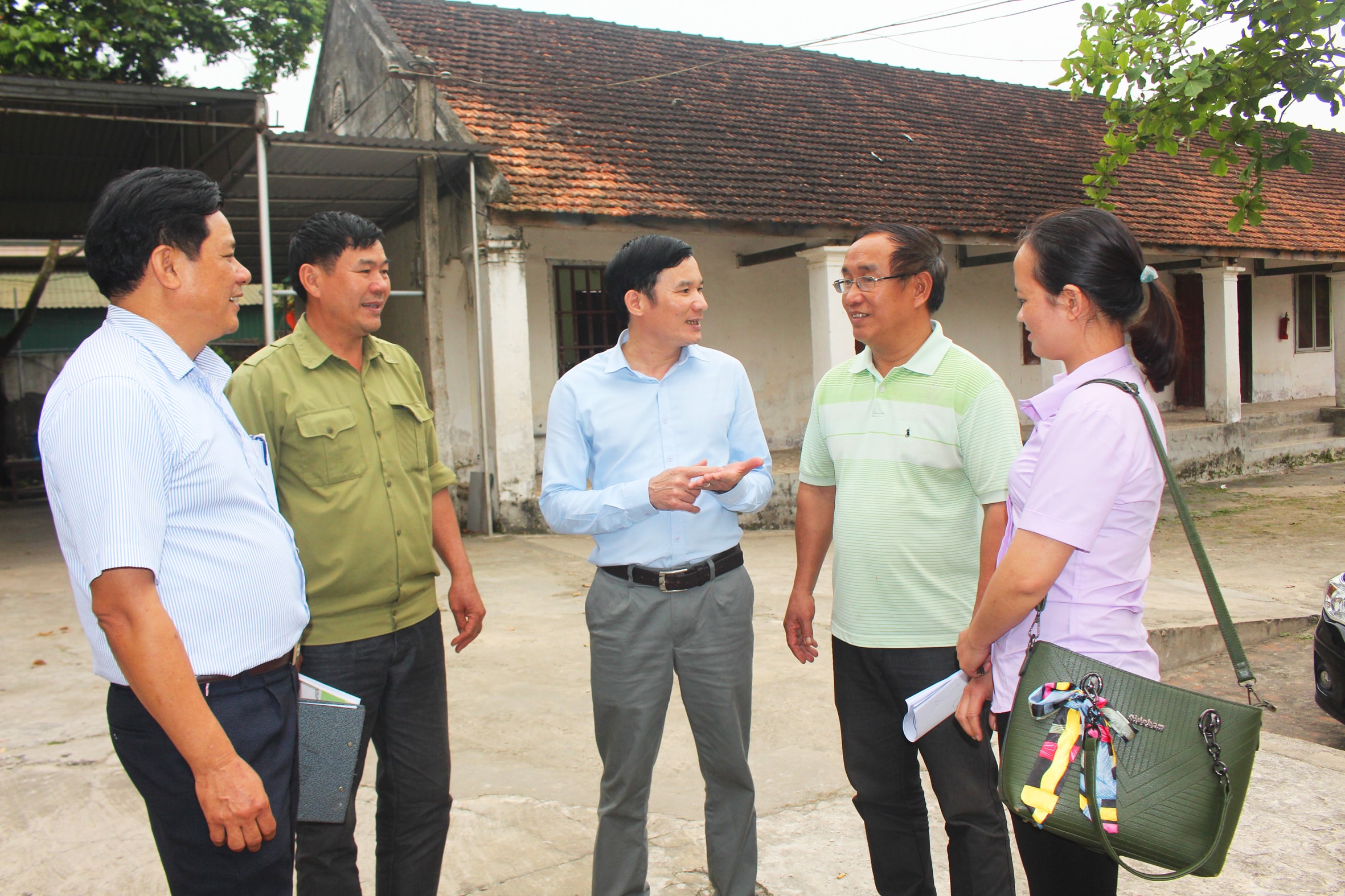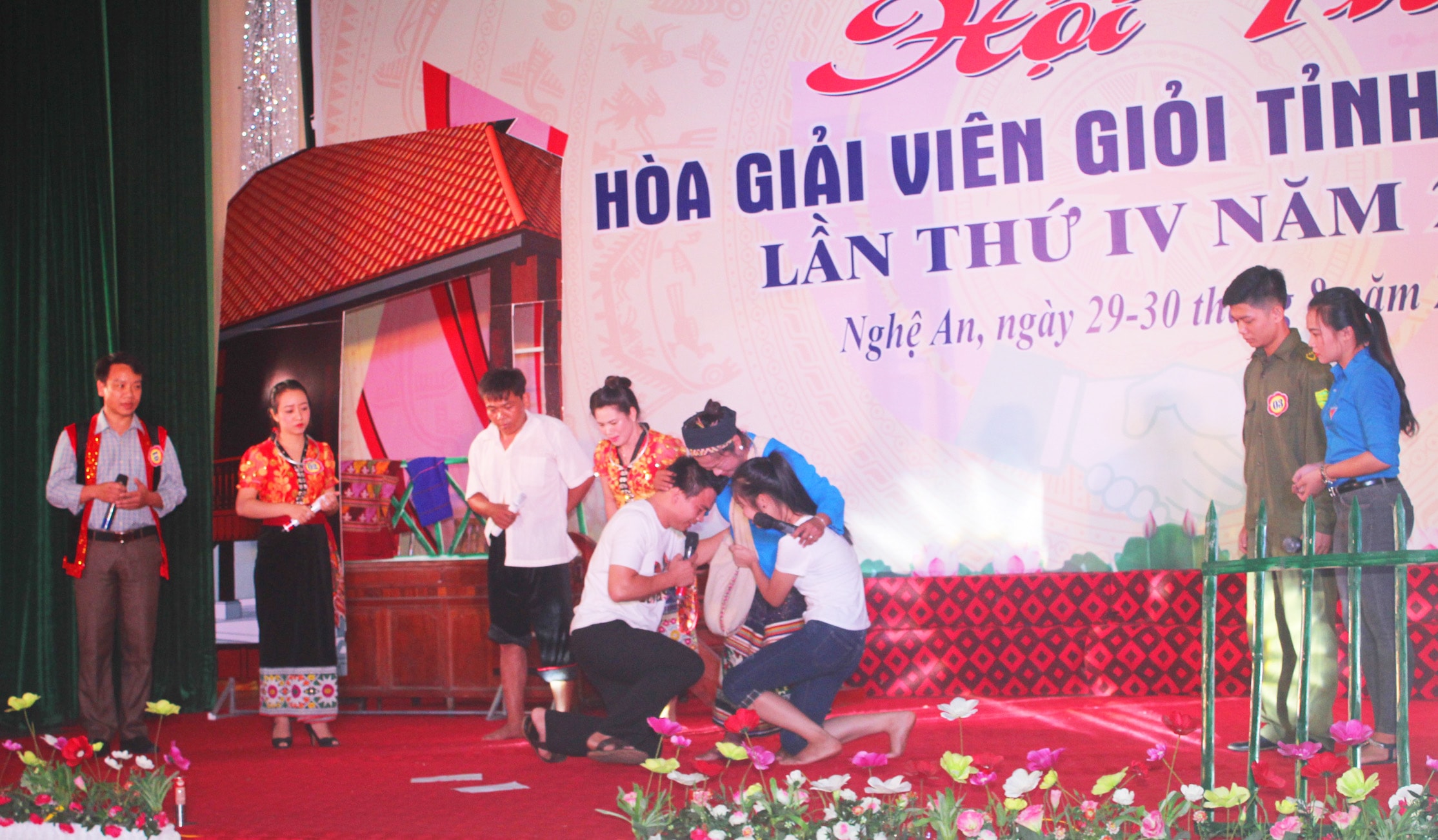Many shortcomings in grassroots mediation
(Baonghean) - Grassroots mediation is considered the "glue" that binds solidarity, mutual love and mutual assistance in the community. However, looking back at 3 years of implementing the Law on Grassroots Mediation, it shows that there are still many shortcomings, significantly affecting the effectiveness of this activity.
Meet the "prisoners and generals"
Although he is 77 years old this year, Mr. Nguyen Duc Chu (66 years old) - Head of the mediation team of Hamlet 6, Tan Son Commune, Do Luong District, still diligently reads books and newspapers, learns about effective ways of doing and speaking to calm the situation when there are conflicts in the community. Having been involved in this job for nearly 15 years, Mr. Chu has been able to calmly handle all situations, from land and garden disputes; marital conflicts, domestic violence to fighting.
 |
| Leaders of the Department of Justice talk with mediators in Do Luong district. Photo: Phuong Thao |
According to Mr. Chu, the two most important factors for successful reconciliation are to speak correctly and persuasively, and to use village rules and regulations as standards, because in reality, "the king's law is weaker than village customs" is still maintained in many villages today, especially in rural areas.
Many stories behind the bamboo fences of the village were told by Mr. Chu, such as the family where a 28-year-old son abused his elderly mother, the alcoholic husband beat his wife and children, neighbors carrying weapons to "talk to each other" because of disputes over fences and banana bushes... Recalling, Mr. Chu felt satisfied because all of those incidents were resolved by the mediation team that came to the scene to calm the situation, now not only are there no arguments but family affection, village affection, and neighborhood affection are stronger.
Coming to Thinh Son commune, nearly ten kilometers from the center of Do Luong district town, meeting Ms. Thai Thi Hien - Head of the mediation team of hamlet 11, we can fully understand the enthusiasm and dedication of this woman. Her husband is far from home, she is raising two small children alone, and also holds the position of secretary and hamlet chief, but Ms. Hien is still mentioned by the people here with respect for her dedication and responsibility in grassroots mediation work. For the past 10 years, hamlet 11 has not had any petitions to higher levels, no major conflicts, and the people's lives are peaceful.
Sharing about this, Ms. Hien said, “Here, the 8 members of the mediation team regularly closely follow the lives of each household, understand the situation, so when conflicts arise, they will know where to “solve” them. Even though she herself is busy, she still regularly visits each house to visit people, share, and encourage them to comply with the law and strive to develop the economy.
Dedicated and enthusiastic people like Mr. Chu and Ms. Hien are shining examples in mediation work at the grassroots level. However, in reality, not every location and not every mediator can achieve such success. Because up to now, they have been considered as "carrying the prison and the whole country".
There is no regular funding source, if any, it is only a few hundred thousand dong in compensation for a successful mediation case. Not only that, the nature of the work also causes the mediator himself to sometimes be implicated, so many people develop a fear of conflict. Therefore, it is not difficult to understand that in many places, mediation activities are sometimes formal, perfunctory, passive, even administrative (such as mediators requiring parties to submit a request before accepting and conducting mediation...).
Difficult in terms of capacity and level
Besides financial difficulties, mediation work at the grassroots level still has many other shortcomings. In some localities, especially remote areas, due to low educational level, backward customs and practices, mobilizing women to participate in mediation activities is still difficult, many mediation teams do not ensure the structure of female mediators, which partly affects the effectiveness of mediation activities, especially in cases of marriage and family, prevention of domestic violence, gender equality... For example, in the mountainous district of Tuong Duong, out of a total of 770 mediators, only 162 are female.
Mr. Le Ba Thieu - Head of the Department of Propaganda and Dissemination of Law (Nghe An Department of Justice): "Most of the problems that arise come from the difficulty in funding support for mediators. There is no source and it is not possible to mobilize organizations and individuals to contribute and support financially and in terms of facilities, so it is very difficult to improve efficiency."
The education level and legal knowledge of the conciliators are also issues worth discussing. In mountainous areas, conciliators are often village elders and village chiefs who have prestige in the community, so they often resolve matters based on life experience and customary law, not based on legal regulations.
In the lowlands, however, lawyers, jurists, former judges, prosecutors, investigators, enforcement officers, examiners, officials, civil servants, and public employees who meet the qualifications have not been encouraged and mobilized to become mediators in their residential areas or to support and assist mediators in conducting mediation activities at the grassroots level. Currently, in the whole province, the number of mediators with legal qualifications accounts for only 4.5%.
In some cases, because the mediators do not have a firm grasp of the regulations, they still mediate cases that are not within the scope of mediation, such as violations of the law that must be handled administratively or prosecuted criminally. This directly affects the quality and effectiveness of mediation activities at the grassroots level, and even infringes upon and directly affects the legitimate rights and interests of the disputing parties.
 |
| A performance at the Nghe An Province Excellent Mediator Competition. Photo: Phuong Thao |
Mediation is a tradition, a good morality, imbued with humanity, based on social ethics and legal foundation. However, it can be seen that the current mediation work still has many issues that need to be discussed. Determining the responsibility of the mediator in mediation at the grassroots level is the person who "unties the knots" in disputes arising from the grassroots level, preventing the situation of "a small thing becoming a big thing" or "a small matter becoming a big thing", the authorities need to promptly have solutions to pay due attention to promote maximum effectiveness.
Currently, the whole province has 21 district-level units with 5,884 mediation teams with 39,256 mediators. In 2017, 4,828 mediation cases were received (a decrease of 356 cases compared to 2016), of which 3,635 cases were successfully mediated (accounting for 75.2%); 1,081 cases were unsuccessfully mediated (accounting for 18.3%), and 112 cases were being mediated.


